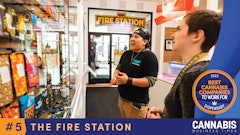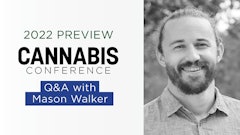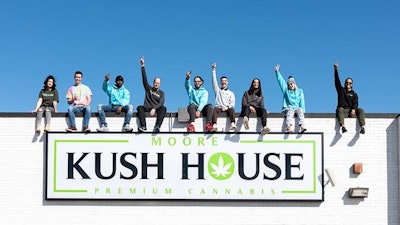
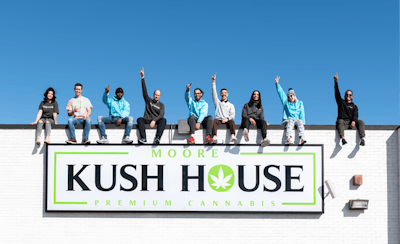
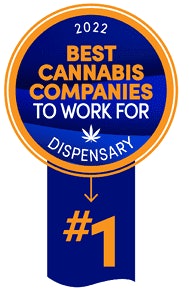
Photos by Evan Beasley
Christian Hahn often stopped by Kush House’s Oklahoma City location in the summer of 2020. He worked for a burger joint down the road, and he’d pop into the dispensary to make deliveries and drop off coupons for owners Daniel Holcomb and Frank Baker. Over time, in the lively heart of the state’s largest city, a bond was formed. This is the nature of the cannabis business. Its gravity is powerful.
“This guy had the right mindset, the right heart. He was energetic,” Holcomb says now. “We just saw the potential in him.”
In August of that year, Kush House opened interviews for new jobs at the company. Holcomb and Baker had been the sole employees since the venture first opened in September 2019. They’d been doing everything, from the administrative tasks of management to the buildout of their 1,500-sq.-ft. shop on North Classen Boulevard, and even budtending.
Hahn came in and blew them away with his attitude in the interview. He was hired on the spot. And his first action item? He told his new bosses that he was going clean the bathrooms.
“Then he puts everybody on point to keep the bathrooms clean,” Holcomb says with a laugh. “He set the standard. He was one of our guys who we’ve been able to promote, because he's got a very good work ethic. He definitely wants to be a part of this culture, and he's done nothing but show that.”
Hahn, now the district manager for Kush House, is a good example of how Kush House engages its growing team. Even today, with a second location open in nearby Moore (and a third on the way in Hydro), an active, open-minded company culture is what propels the dispensary business in Oklahoma’s fast-paced free-market medical cannabis program.
The business plan started a few years prior to Opening Day at Kush House, when Holcomb and Baker met during their time in the U.S. military, serving in the same reservist unit. Following their service, as the prospects for legal medical cannabis market grew into reality, a nagging idea continued to crop up in their conversations—between the two of them and their wives. The opportunity seemed too incredible to pass up. Both men had medical backgrounds from their time in the military, and by that point cannabis was shedding its stigma even in the more conservative corners of the U.S., like Oklahoma.
Whatever shape this business might take, Holcomb and Baker knew that it would only materialize through sweat equity and day-in, day-out dedication to the market.
“It was just me and him,” Holcomb says of the partnership. “My dad came along with us. We did the build-out, we put the walls up, the doors up. And then me and Frank and my dad, we sat out front and we budtended for the first year. Every other dispensary in Oklahoma opened up, and you know how it is out here: It's pretty easy to get a license. So, there were dispensaries everywhere. Honestly, we didn't know what the fuck we were doing. We were just trying to figure it out.”
Oklahoma is unique in many respects, not the least of which is the state’s approach to medical cannabis. After State Question 877 was passed by voters in 2018, the state Legislature enacted a law that allowed an unlimited number of cannabis business licenses to be issued. Whereas most states in recent years have set some sort of cap on licensure, Oklahoma took the opposite approach and waved every entrepreneur through the door. Students of history will note the echoes of the original 1889 Land Rush that saw white settlers first claim land within the state’s early borders.
As of Feb. 7, the state listed 8,137 cultivation licenses, 2,232 dispensary licenses, 1,508 processor licenses, 103 transportation licenses and 29 lab licenses.
Holcomb and Baker also launched a cultivation business that first year, but instead opted to focus solely on medical retail, consolidating their attention on one segment of the market. The landscape was already filling up fast with stiff competition.
How they went about developing a retail business was straightforward enough: By working simultaneously as purchasing managers, store managers and on-the-floor budtenders, Holcomb and Baker forced themselves to learn the economics and the science and the salesmanship of this new industry. It was a crash course on the frontier of Oklahoma’s rapidly expanding medical cannabis marketplace.

And only when they had a grip on the business did they decide to hire a team to help them grow Kush House from a small shop in Oklahoma City’s Classen neighborhood to a brand—something larger than the sum of its increasing number of parts.
Then the pandemic hit.
In the spring of 2020, businesses began shuttering en masse. State governments, in most cases, greenlit cannabis dispensaries as “essential businesses,” allowing them to stay open. Still, Holcomb says, many dispensary owners decided to close their doors during that complicated moment. However, after hearing from patients in need of a reliable supply of medicine—especially those who worked late or otherwise kept unusual hours—Holcomb and Baker decided to flip the switch and leave the store open 24 hours a day.
“We get on the phone,” Holcomb recalls, “and I'm like, ‘Frank, people are asking for 24 hours!’ And he's like, ‘Well, why not?’”
“It took us three days [to get up and running for 24 hours],” Baker says.
With an expanded business plan—and the sort of urgency known only to those in the fledgling cannabis space—Kush House grew as a company overnight. This was no longer the Daniel-and-Frank story. Now, they needed to grow their team into a capable phalanx, a single-minded unit committed to the cause and to uplifting the individual members of that team.
Around that time is when they hired Hahn to run the Classen store.
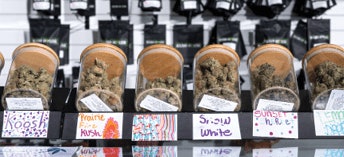
“Working with these guys and having the opportunities they've laid out for me has been pretty awesome for sure,” Hahn says. “I wouldn't trade it for the world.”
The success of Kush House’s 24-hour pivot proved so vital to the company’s mission that the team kept it in place. When Holcomb and Baker decided to expand the business and set up shop in Moore, Okla., they made sure to leave the lights on day and night. But they also made a key decision that would distinguish this new location in an important way: They sought out an old tire shop with four bays.
“At Moore, from the opening, we wanted to have that accessible medicine for the patients,” Holcomb says.
They wanted to build a drive-thru. By converting one of the tire bays to this retail operation, this conversation to add a drive-thru would enable Kush House to serve patients with busy schedules—or patients who might be driving around town with children or pets in the car. Increasingly the drive-thru model is taking hold in cannabis markets around the U.S., a new analogue to the classic beverage shops or fast-food restaurants that dot the American landscape.
The co-owners hit the streets of Oklahoma City to find out what worked best in this particular business niche, pulling their cars into like-minded retailers to find out what was working.
“What we started to find, consistently, was Chick-fil-A's drive-thru method,” Baker says. “Chick-fil-A used to be one of the worst drive-thrus, back in 2018 or 2017. Then they reemphasized it. And now, I would start in a line where I'm back in their parking lot and I would time [the drive-thru]. Every time I came to that line, I’m in line no longer than seven minutes. So, we started to develop thresholds of our own.”
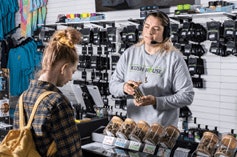
Five to seven minutes: That’s how quickly a patient should be served, barring any longer conversations or general shopping in the store. Speed is not always the most critical element of the medical cannabis retail environment, but it certainly pays to be able to serve a patient’s needs right-quick. Now, when Holcomb and Baker walk into the Moore store, their eyes immediately target the drive-thru. Are cars moving swiftly through the transaction? Are people waiting? Are staffers satisfying the promise of a Kush House purchase?
“We’re basing everything off of, ‘If I was a patient …’” Holcomb says. “Like, ‘We are patients, so how would we want to be treated if we were the patients?’ That’s how the business works.”
That ethos redounds to the Kush House employees, too, to be sure. More often than not, Holcomb and Baker say, their employees have come from their patient base. The business cultivates something like a family atmosphere—Baker invokes the culture of a barber shop, where everyone knows one another and customers frequently request staffers by name on the sales floor—and this engenders a feeling of mutual trust throughout the company.
Kush House boasts a 4.9 star rating on menu and ordering platform Weedmaps. The company has seen no turnover in the past fiscal year, which could be contributed to a number of factors, from offering benefits like health insurance, to allowing for employee-driven inventory decisions, and more. The two owners have made sure to offer ongoing skills-based training for all employees, providing rewards for those who excel, and identifying routes to grow within the company. They’ve also set up pathways for housing assistance, transportation, and food care to be made available to employees and their families when in need. Informal gestures, like employee appreciation lunches and sales contests, keep the team plugged into a central goal: serving Oklahoma’s growing patient base and fine-tuning the day-to-day operations of the dispensary business.
Hahn walked in from his gig at the burger joint and started cleaning the bathrooms on day one. Now, he’s the district manager overseeing the expansion into Hydro. He was hired less than two years ago, and his story is not the only example of internal promotion and team-oriented development.
Kush House started with two guys selling medical cannabis. Now, with 36 employees under the corporate banner, there’s no telling what the future will bring.













